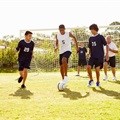
Co-curricular, not extracurricular: Role of sports in academic excellence

As both an educator and a lifelong sportsman, I’ve seen the transformative effect that structured, competitive sport has on a young person’s development — not just physically, but cognitively, emotionally and socially. I’ve also experienced, firsthand, how my involvement in sport has energised and shaped my own leadership, both in the classroom and in school governance.
Benefits of sport
Sport builds the physical stamina required to stay sharp and motivated through demanding academic schedules. It enhances mental well-being, reducing the likelihood and impact of stress and anxiety. It encourages consistent routine, resilience, and time management. And far from interfering with classroom focus, it improves it.
The research increasingly supports what educators have long suspected: students who are actively involved in sport tend to score higher on standardised tests, are more likely to go on to tertiary study, and even enjoy long-term economic advantages, including higher annual earnings. But beyond statistics, sport cultivates something more fundamental — character.
Team sport, in particular, teaches young people to see beyond themselves. It creates opportunities to lead, to listen, to fail, to try again. It requires real-time problem-solving and rapid decision-making. It asks players to play their part, understand their role, and trust the collective plan. These are the very qualities we hope to nurture in the next generation of citizens and leaders.
The language of sport and the language of leadership often overlap for a reason. As a hockey player now competing at Masters provincial level, and as a coach of young athletes, I’ve come to view the field not just as a physical space but as a training ground for life — a space where the discipline of preparation meets the unpredictability of competition. A space where identity is shaped through challenge and camaraderie.
Holistic development
In education, we speak often about holistic development — about developing the whole child. Yet it’s easy, especially in pressure-filled academic environments, to relegate sport to the category of ‘nice to have’. This is a missed opportunity. Sport is not an extracurricular activity. It is co-curricular — as important as any subject, and just as capable of cultivating intellect, confidence and empathy.
As educators, we have a responsibility to design environments where young people do not have to choose between their potential in the classroom and their potential on the field. These spheres are not mutually exclusive — they are mutually reinforcing. Academic rigour and physical excellence thrive best in a culture that values both, and recognises that each develops different but equally essential human capacities.
Excellence, after all, is not achieved through focus on a single domain, but through the interplay of many. When we help students pursue excellence in more than one arena — academic, athletic, artistic — we are preparing them not just for tests or trophies, but for a full and meaningful life.
If we truly want to raise future-ready young people — thoughtful, resilient, and equipped to solve complex problems — we must place sport not at the margins, but at the heart of how we educate.
About the author
He began his teaching career at St David’s Marist Inanda in Johannesburg. Over the course of 12 years, he became the Head of Hockey and 1st Team coach, a senior Geography teacher, and Housemaster. In 2013 he joined Uplands College as Deputy Head Pastoral Care and Boarding. In his seven years there, Alex also managed the marketing department, the sports department, energised the past pupil association and co-developed the Foundation.
He was appointed as College Head of Reddam House Constantia in January 2020, bringing a wealth of knowledge and experience that has contributed towards the school being one of the top achieving IEB schools in South Africa. Alex is passionate about Education and making a difference to those under his care.